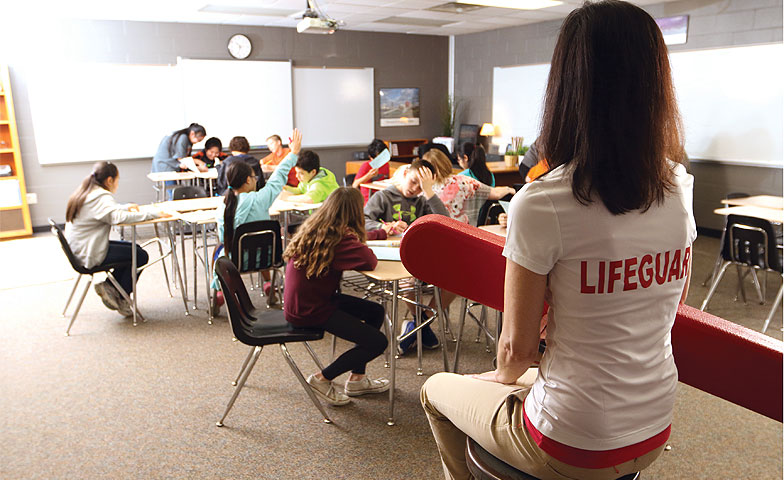Academic lifeguards are on duty, on guard, and willing to jump in when necessary.
You are a lifeguard on a beach and you see a child engulfed by an enormous wave, then struggling to keep her head above water. You use every skill you have to prevent the child from drowning.
Academic lifeguards are no different; they save students—and they do it in part by building better relationships.
At Huron Middle School in South Dakota, where we hold all students accountable for learning, every adult is a lifeguard. Our lifeguards know which students must be pushed to excel at learning, which students can work alone, which students need to be closely monitored, and which students are in over their heads.
Layers of Lifeguards
Our staff first learned about this lifeguarding concept when we read the book The Power of ICU by Danny Hill and Jayson Nave; we now are in our fourth year of training all staff members (teachers, para-educators, counselors, administrators, administrative assistants, nurses, and athletic coaches) to be academic lifeguards.
We use a layered lifeguarding approach, and although our roles vary, we hold each other accountable for building relationships and watching over our students.
• Primary Lifeguards. Our classroom teachers are our primary lifeguards. The students are ultimately responsible for learning the academic standards, but our classroom teachers provide extra time and extra help to ensure learning takes place. When primary lifeguards sense some students may be struggling, they make developing a rapport with those students a priority, allow extra time for students to master the standards, and provide additional academic assistance before school, during a scheduled intervention period, and after school.
• Grade-Level Lifeguards. Our grade-level lifeguards provide an extra set of eyes and work daily to build connections with struggling students. This special group of teachers and para-educators, appointed to each grade level, remind students about their missing assignments and provide homework help to students during working lunches. Our grade-level lifeguards get to know their students’ stories and determine what interventions will work best.
• Personal Lifeguards. Every school has a few students whom the staff members consider exasperating. We do not give up on them! Every student deserves an adult advocate and the ones who are most taxing need the most help!
Our personal lifeguards, a select group of volunteer staff members, keep watch over our most underperforming and apathetic students. They establish caring relationships with these challenging students and work tirelessly to develop and implement customized intervention plans to get their learning back on track.
• Parent Lifeguards. We use a web-based system to monitor missing assignments and send automated text and e-mail messages to parents. When children are missing assignments, parents are notified and given the option to reply directly to classroom teachers. Follow-up messages inform parents when the assignments are completed.
An automated process can never replace personal communication. Therefore, follow-up discussions about missing and poor-quality work still take place among parents, students, and teachers. These conversations are documented in parent communication logs and reviewed periodically by the administration.
• Head Lifeguard. It takes great coordination to pull off a school-wide intervention program. Therefore, we have designated a staff member to oversee our lifeguard system. In addition to instructional coaching responsibilities, this head lifeguard works every day to build relationships and bridge communication gaps between staff, students, and parents.
Emergency Support
Every school has a few students who drift aimlessly in darkness. School is not enjoyable for these students and their home lives are often a mess. What do we do for these students who are in the most need of our help?
Normal rescue plans do not work for these unconventional situations, so we think outside the box. If we have enough parent support, we pull together quarterly academic support teams for Family Day. On Family Day, we reserve a private room in our school and invite parents of underperforming learners to sit beside their children as they work, with their teachers, to finish their missing assignments. Parents enjoy the day and walk away with a better understanding of the support system we have in place to ensure their child experiences academic success.
Even without parental support, we can still hold all students accountable for learning. We focus on what we can control by drafting emergency support plans to save our most challenging students. If we have students with an excessive number of missing assignments, we pull them from class for a day to two to work one-on-one with our principals, substitute teachers, and adult volunteers.
Students who chronically have missing work sometimes benefit from a schedule change; we replace one of their elective classes with small-group tutoring. Occasionally we switch teachers if there are personality conflicts. Sometimes it takes limitless patience and unrestrained creativity to reach the students who need us most.
Rescue Skills
Our exemplary lifeguards get to know our students and do whatever it takes to ensure every student in our school experiences academic success. Our most superb lifeguards…
- Love kids and kids know it.
- Exhibit high energy, positive attitudes, and a sense of humor.
- Are tenacious and firm when necessary.
- Model integrity, respect, responsibility, and accountability.
- Contribute to a team-orientated environment.
- Communicate effectively with staff and students.
- Work adeptly with a variety of students and skill levels.
- Help all students experience academic success.
Our first-rate lifeguards watch and wait, and whenever they are needed, they go, without hesitation, to the aid of our struggling students. When underperforming students begin to thrive, they return to their post to watch for the next student who needs extra assistance.
Lifeguarding is rewarding work.
How are our lifeguards rewarded? They are challenged. They are inspired. They are proud. And they know they are saving students.


